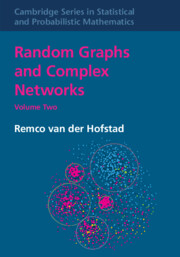
- Publisher:
- Cambridge University Press
- Online publication date:
- February 2024
- Print publication year:
- 2024
- Online ISBN:
- 9781316795552


Complex networks are key to describing the connected nature of the society that we live in. This book, the second of two volumes, describes the local structure of random graph models for real-world networks and determines when these models have a giant component and when they are small-, and ultra-small, worlds. This is the first book to cover the theory and implications of local convergence, a crucial technique in the analysis of sparse random graphs. Suitable as a resource for researchers and PhD-level courses, it uses examples of real-world networks, such as the Internet and citation networks, as motivation for the models that are discussed, and includes exercises at the end of each chapter to develop intuition. The book closes with an extensive discussion of related models and problems that demonstratemodern approaches to network theory, such as community structure and directed models.
‘Even before its publication, the second volume of ‘Random graphs and complex networks’ has become a classic for anyone working in random graph theory. Remco van der Hofstad manages to treat in detail a very large extent of this fascinating theory, while staying extremely pedagogical and accessible to a broad audience. It covers in depth the local convergence and small-world properties of scale-free random graphs. Together with the first volume, these are among the essential books every probabilist should have on their shelf!’
Nicolas Curien - Université Paris-Saclay
‘This is a wonderful book, covering major topics at the forefront of modern random graph theory and its application to the modelling and description of real-world complex networks. Whereas Volume 1 covers basic models, ideas and techniques, Volume 2 focusses on two key topics - connected components and small world properties – for three different classes of random graphs - inhomogeneous random graphs, configuration models, preferential attachment models. At the basis is the notion of local convergence, which is powerful tool to describe large sparse random graphs. Suitable for researchers at the level of PhD and above, the two volumes will become a landmark in network science.’
Frank den Hollander - Leiden University
 Loading metrics...
Loading metrics...
* Views captured on Cambridge Core between #date#. This data will be updated every 24 hours.
Usage data cannot currently be displayed.